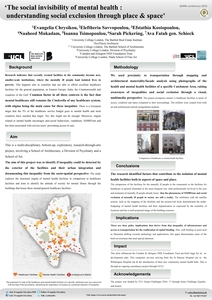Chrysikou, E;
Savvopoulou, E;
Kostopoulou, E;
Mukadam, N;
Tsimopoulou, I;
Pickering, S;
Fatah gen. Schieck, A;
(2019)
The social invisibility of mental health: understanding social exclusion through place & space.
Presented at: QHRN Conference 'Crafting the Future of Qualitative Health Research in a Changing World’, Radisson Blu, Portman Hotel, London.

![[thumbnail of Qualitative poster 2019 _ Chrysikou_.jpg]](https://discovery.ucl.ac.uk/10071249/1.hassmallThumbnailVersion/Qualitative%20poster%202019%20_%20Chrysikou_.jpg)  Preview |
Image
Qualitative poster 2019 _ Chrysikou_.jpg - Accepted Version Download (8MB) | Preview |
Abstract
Background Mental health is considered the Cinderella of any healthcare system. There is a European target that the 5% of the healthcare service budget goes to mental health and most countries have reached that target. Yet, this might not be enough to cover the inequity between health and mental health provision. Aim ‘The social invisibility of mental health facilities’ is a multi-disciplinary, innovative, research-through-arts project, involving a School of Architecture, a Division of Psychiatry and a School of Art. The aim is to detect if there are elements demonstrating inequality demonstrated from place and space related to the facility provision. Methods It compares healthcare vs mental health facilities of the same catchment area, raising awareness of inequalities between the two and the social exclusion of mentally ill people through a visual, multimedia perspective. It juxtaposes (mental) healthcare facilities in terms of access, condition and status compared to their surroundings. The exhibits were created from both art and architectural schools postgraduate students. The exhibition took place close to Bentham’s auto-icon, the designer of Panopticon custodial facility, demonstrating inverse links between his Panopticon, and the concealment/invisibility that NIMBYism produces towards the mentally ill that resulted in their exclusion, within deprived, under-funded, isolated facilities “in the community”. Conclusions The exhibition with the satellite actions, such as the mapping of the facilities and the picture-rich book demonstrated the under-budgeting of mental health facilities and their stigmatization as expressed by the centrality of locations and the overall projected image of the building exteriors. This outlined the path for integrated, transdisciplinary research in the future involving architecture, arts and psychiatry.
Archive Staff Only
 |
View Item |


